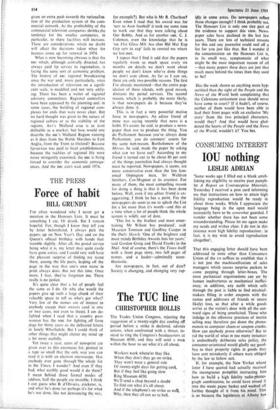Force of habit
THE PRESS BILL GRUNDY
I've often wondered why I never get a mention in the Honours Lists. It must be something 1 ate. Or drank. But I remain hopeful. For, though I know they tell you by letter beforehand, I always pick the papers up on New Year's Day and on the Queen's official birthday with hands that tremble slightly. After all, the postal service being what it is, my letter may quite easily have gone astray, and I could very well have the pleasant surprise of finding my name there, among the life peers, leaping off the page in the way that one's own name in print always does. But not this time. Once more, I fear, they've forgotten me. There really is no justice.
It's quite clear that a lot of people feel the same as I do. Or why else would the papers give up such a large chunk of their valuable space to tell us who's got what? Very few of the names are of interest to anybody except their owners (and in one or two cases, not even to them). I am de- lighted when I read that a country post-
woman has the MBE for fighting,.off farm dogs for thirty years as she delivered letters in lonely Wharfedale. But I could think of other things that might clutter my mind up a bit more usefully.
Yet twice a year, acres of newsprint are given over to this enormous list, printed in a type so small that the only way you can read it is with an electron microscope. Has anybody ever gone through °the whole list in the Times, I wonder? And even if they had, what earthly good would it do them? I mean behind those formal modes of address, half the people are invisible. I think I can guess who B. d'Oliviera, cricketer, is, and what he's done (or perhaps it's for what he's not done, like not denouncing the mcc, for example?). But who is Mr R. Charlton? Even when I read that his award was for `sery to Assn football' it took me some time to work out that they were talking about Our Bobby. And as for another OBE. C. J. Coleman, even the knowledge that he is `sec Flat Glass Mfr Ass chm Bld Mat Exp Grp sery to exp' fails to remind me where we last met.
I repeat that I find it odd that the papers regularly waste so much space every six months on details we don't want about people we don't know who've done things we don't care about. As far as I can see, there are only two possible reasons. The first I've already mentioned—that the entire pop- ulation of these islands, with good reason, distrusts the postal services. The second reason, which is probably the more likely, is that newspapers do it because they've always done it.
This is in fact a very powerful motive force in newspapers. An editor friend of mine was saying recently that news is a habit. It's easier, he said, to produce a news- paper than not to produce the thing. You do Parliament because you've always done Parliament; you do coroners' courts for the same non-reason. Bartholomew of the Mirror, he said, made the paper by asking what can we leave out? According to my friend it turned out to be about 80 per cent of the things journalists had always thought must be reported. Newspapers, it seems, are more conservative even than the late lam- ented Orpington man, Sir Waldron Smithers, Cro-Magnon at its crustiest. For many of them, the most compelling reason for doing a thing is that it has been done before. Well, even if my editor friend is ex- aggerating, I think he has a point. For the newspapers do seem to me to splash the List for a lot more than it's worth—and this at a time when a lot of people think the whole system is wildly out of date.
This list is the liveliest and most enter- taining Mr Wilson has produced', said Maureen Tomison and Geoffrey Cooper in the Daily Sketch. 'One of the brightest and
most trendy Birthday Awards lists for years,'
said Gordon Greig and David Franks in the Mail. And of course, there's the Times itself
with a front page story, two full pages of names, and a leader—admittedly unen- thusiastic.
Are newspapers, in fact, out of date? Society is changing, and changing very rap-
idly in some areas. Do newspapers reflect those changes enough? I think probably not. The Honours List is only one tiny part of the evidence to support this view. News- paper sales have declined in the last few years. There are lots of technical reasons for this and any journalist could reel off a list for you just like that. But I wonder if the concentration on the Honours List is, in its small way, symptomatic of what might be the most important reason of all —that many papers these days are just that much more behind the times than they used to be?
Has the week shown us anything more hyp- ocritical than the sight of the People and the News of the World both complaining that the Celentano enticement case should never have come to court? If it hadn't, of course, neither of them would have been able to lead their front pages with an exclusive 'My story' from the two principal characters, would they? And that would have glad- dened the hearts of the People and the News of the World, wouldn't it? You bet,






































 Previous page
Previous page